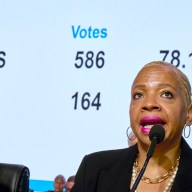You might have heard, “Pick up a book; TV just rots your brain,” when you were a kid. Turns out that might have been right.
Young and old alike will crack spines together on Jan. 23 for Family Literacy Day, an initiative sponsored by private sector literacy foundation ABC Canada. The date will feature various events nationwide aimed at promoting reading and breaking a Guinness World Record for Most Children Reading With An Adult, Multiple Locations.
The activity, however, may prove more important for adults than kids. The latest data (2003) from Statistics Canada and the international Organization for Economic Co-operation and Development (OECD) revealed disturbing numbers. Four out of 10 Canadians aged 16 to 65 have problems reading material beyond a Grade 11 level, with 16 per cent of Canadians struggling with a reading level above Grades 5 or 6.
“It’s concerning because while our economy in the past has given us lots of jobs for people with low skills, those jobs are disappearing very quickly,” says Margaret Eaton, president of ABC Canada. “As the labour market changes, Canadians are not going to have the skills they need to participate.”
The problem transcends economic concerns, notes Eaton. Poor reading skills can lead to misunderstanding food and prescription drug labels, poor workplace safety, barriers to comprehending public information and less civic engagement.
In his 2007 book, The Assault On Reason, former U.S. vice-president Al Gore cites television, not the printed word, as the chief means of gaining information about the world around us, a one-way medium that by its visceral nature hinders reflective thought and reasoned public discourse.
Eaton is reticent to “make television the villain.” Shame tops the list of a number of barriers that adults face. Much like recovering from alcoholism, admitting the problem is the first step to solving it.
“A lot of people end up masking their issues. They have coping strategies they use instead of trying to face it head on,” she said. “It’s hard to learn to read, particularly for those who have learning disabilities who didn’t get them addressed early on.”
But rising mediums may yield a brighter future. While they won’t teach literacy, text-heavy websites will certainly encourage it, Eaton said.
“Computers, video games, all of those mediums involve a lot of text reading and can be a tremendous boon,” she said.
“We suggest you surf the net or play video games with your kids, because those are the kinds of family activities that promote literacy.”
















